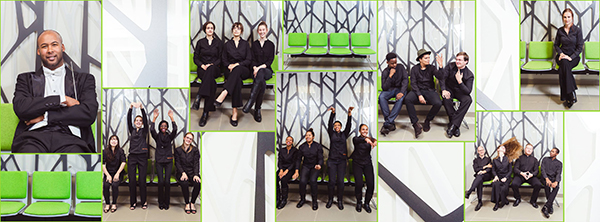Latest News Archive
Please select Category, Year, and then Month to display items
13 January 2020
|
Story Eugene Seegers
|
Photo Anja Aucamp
 Spearheading the digital expansion of the conversational Sesotho course is IDEAS Lab Director, Johann Möller (middle). With him are from the left: Prof Pule Phindane, CUT; Dr Brenton Fredericks, CUT; Bahedile Letlala, UFS Department of African Languages; and Dr Elias Malete, UFS Department of African Languages.
Spearheading the digital expansion of the conversational Sesotho course is IDEAS Lab Director, Johann Möller (middle). With him are from the left: Prof Pule Phindane, CUT; Dr Brenton Fredericks, CUT; Bahedile Letlala, UFS Department of African Languages; and Dr Elias Malete, UFS Department of African Languages.
For many years now, the UFS has been offering a one-year course in conversational Sesotho for staff members; this can then be followed up with the one-year course in advanced conversational Sesotho. The conversational Sesotho for students in the Faculty of Education was introduced in 2018 at the UFS.
The Central University of Technology (CUT) needed a conversational course for its first-year students and approached the Department of African Languages for the development of such a course. Living as we do in a multilingual country; this additional language skill opens doors and often hearts as well.
Using instructional design principles
However, the need was identified by both CUT and UFS to present this crucial information in a way that would be more appealing to digital natives as well as to those less familiar with technology. The Department of African Languages on the UFS Bloemfontein Campus, together with relevant departments from the CUT, approached the IDEAS Lab located on the UFS South Campus, since they already have a reputation for being a specialist on broadcasting and repackaging curricular content for digital presentations. The IDEAS Lab provided technical advice and built the multimedia programme, which will help the user to hear and practice phrases in Sesotho, using instructional design principles. The course will be available to both staff and students belonging to the two universities.
Room for growth
Johann Möller, Director of the IDEAS Lab, says this pilot programme will give both institutions the opportunity to test the use of multimedia for language acquisition. He adds, “Language is extremely complex, and we would like to expand this learning aid in the future.” In fact, the original design has room for growth built into it.
To keep things simple for the user and the building team, it was decided to start out with only four potential everyday scenarios where a staff member would like to speak Sesotho: Firstly, how to greet other persons from different genders; secondly, potential scenarios one might encounter in the university environment itself; thirdly, how to deal with situations at a hospital; and finally, how to use one’s language skills at a filling station.
Pronunciation is key
Each scenario contains three to four conversations that the learner can revise, along with images and audio that illustrate the situation and assist with correct pronunciation. The system does not allow the user to progress unless they have listened to the pronunciations of the sample sentences or phrases.
Further reading material and vocabulary lists are also provided, with the result that people who are using the programme can learn at their own pace. The authoring software Articulate Storyline was used to build the individual scenarios and each conversation or lesson within it. The lessons are also not dependent on an internet connection; they can be downloaded onto a flash memory drive and used offline.
OSM Camerata hosts concert as part of International Ictus Music Competition
2017-05-29

In 2015 the Odeion School of Music Camerata premiered the Hendrik Hofmeyr
Double Concerto for Recorder and Harpsichord with esteemed South African artists
Stefan Temmingh and Erik Dippenaar.
Photo: Supplied
The Odeion School of Music Camerata (OSMC) at the University of the Free State (UFS) will be celebrating its fifth birthday in style when it participates in the 2017 International Ictus Music Competition. The competition is an innovative new online competition for ensembles, orchestras and band/wind ensembles (middle school, high school, youth ensemble, community ensemble and college/conservatory/university) that compete through video submission.
Opportunity for fundraising
As part of the competition the OSMC will host a concert that will also serve as a fundraising opportunity. The concert takes place on 31 May 2017 in the Odeion on the Bloemfontein Campus. The OSMC was strategically founded in 2012 by Marius Coetzee as the Odeion School of Music’s flagship chamber ensemble with the main objective of creating a catalyst for excellence.
International exposure at stake
Substantial money prizes are at stake in the International Ictus Music Competition and ensembles will receive written feedback from a jury consisting of renowned maestri including Stilian Kirov, who was awarded 1st Prize in the Debut Berlin Competition on 18 May 2017. Top prize-winners will be interviewed by a representative from the competition. It will be broadcast internationally to enable them to share their hard work and passion for music with the world.
Over the past five years the OSMC has premiered 10 new works by South African composers specially commissioned for them. A highlight remains its participation in the 13th International Conservatory Festival in St Petersburg Russia, where the ensemble received a standing ovation during a gala concert in the Glazunov Concert Hall.
Date: 31 May 2017
Time: 19:30
Place: Odeion (Bloemfontein Campus)
Entry: R20